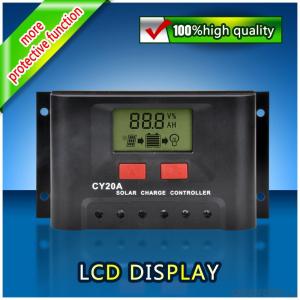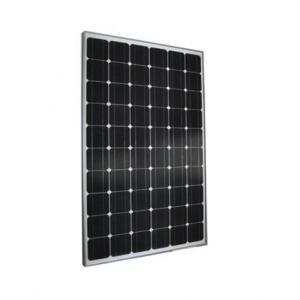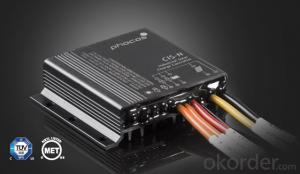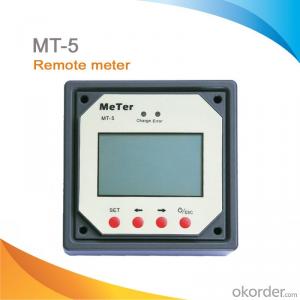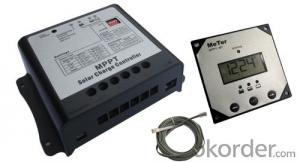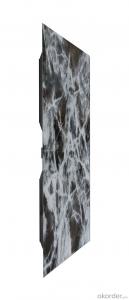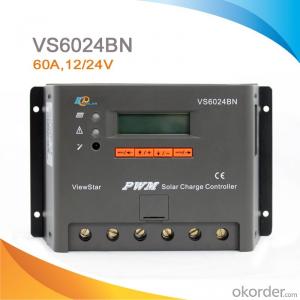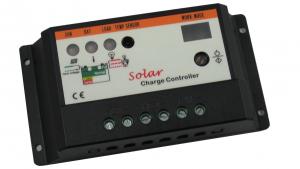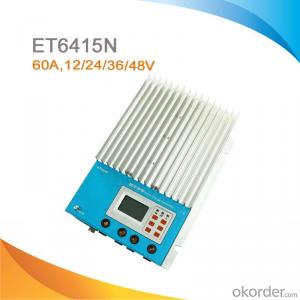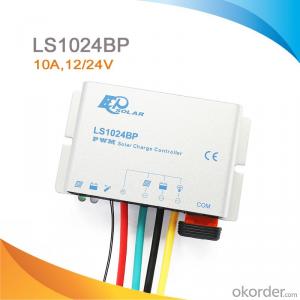Solar LCD Controller CY20A with the best price
- Loading Port:
- China main port
- Payment Terms:
- TT or LC
- Min Order Qty:
- 1 unit
- Supply Capability:
- 10000 unit/month
OKorder Service Pledge
OKorder Financial Service
You Might Also Like
Product Introduction
Solar controller is control device which can control solar panel and transform solar energy into electricity then store to the battery bank. Solar controller is the most important part in offgrid system, whose performance has much effect on life expectancy and operation of the whole system, especially the battery expectancy.
Application Areas
Standalone Photovoltaic power station
Standalone Domestic household photovoltaic power system
Mobil communication base stations, expressway and other non-residential regions.
Coastal islands, remote mountainous, border posts for regions shortage of or without electricity.
Government demonstration projects, landscape lighting project etc.
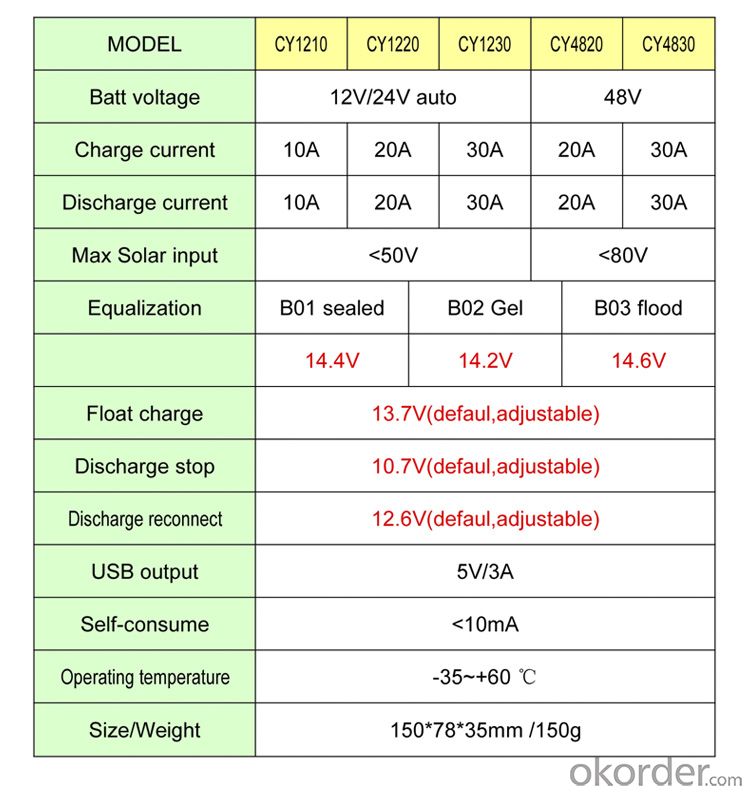
Selection of high-quality materials properties be consistent from beginning to end
For life is a convenient
A little more secure
The innovation design idea of the perfect show
The first set of people-oriented
The high-end configuration components
- Q:How does a solar controller prevent damage to the solar panels from environmental pollutants?
- A solar controller helps prevent damage to solar panels from environmental pollutants by regulating the flow of electricity from the solar panels to the connected battery or grid. One of the key functions of a solar controller is to protect the solar panels from overcharging, which can occur due to excessive sunlight exposure or higher voltage levels. Overcharging can lead to increased heat generation and can make the solar panels more vulnerable to damage from environmental pollutants. The solar controller continuously monitors the voltage and current levels of the solar panels and ensures that they remain within safe operating limits. If the voltage or current exceeds the specified levels, the solar controller automatically adjusts the charging process to prevent overcharging and potential damage to the panels. Furthermore, a solar controller also helps prevent damage from environmental pollutants by providing protection against reverse current flow. During periods of low or no sunlight, when the solar panels are not generating electricity, there is a risk of reverse current flowing back from the battery or grid into the panels. This can cause damage to the solar cells. The solar controller prevents this reverse current flow by blocking it and ensuring that the flow of electricity is always in the desired direction. In addition to these protective functions, some advanced solar controllers also incorporate features like temperature compensation, which adjusts the charging parameters based on the ambient temperature. This helps optimize the charging process and prevents potential damage to the panels caused by extreme temperature variations. Overall, by regulating the charging process, preventing overcharging, and blocking reverse current flow, a solar controller plays a vital role in safeguarding the solar panels against damage from environmental pollutants and ensuring their long-term performance and durability.
- Q:Can a solar controller be used with solar-powered pool heaters?
- Yes, a solar controller can be used with solar-powered pool heaters. A solar controller helps regulate and optimize the performance of the solar panels by managing the flow of energy from the panels to the pool heater. It monitors and adjusts the temperature, ensuring efficient heating and preventing overheating. By using a solar controller, pool owners can maximize the benefits and effectiveness of their solar-powered pool heaters.
- Q:Can a solar controller handle multiple solar panels?
- Yes, a solar controller can handle multiple solar panels.
- Q:What is the temperature range for a solar controller?
- The temperature range for a solar controller typically varies between -40°C to 80°C.
- Q:Can a solar controller be used with a solar-powered manufacturing plant?
- Yes, a solar controller can be used with a solar-powered manufacturing plant. A solar controller regulates the flow of electricity from the solar panels to the manufacturing plant, ensuring optimal power generation and utilization. It helps manage the charging and discharging of batteries, monitors system performance, and protects the equipment from overcharging or excessive discharge. By effectively controlling and optimizing the solar power system, a solar controller enhances the efficiency and reliability of a solar-powered manufacturing plant.
- Q:Can a solar controller be used in a solar-powered electric motorbike racing system?
- Yes, a solar controller can be used in a solar-powered electric motorbike racing system. A solar controller regulates and optimizes the charging process of the solar panels, ensuring efficient energy transfer to the batteries. In a solar-powered racing system, the solar controller would play a crucial role in managing the energy flow, maximizing the performance and longevity of the batteries, and ultimately enhancing the overall efficiency of the motorbike.
- Q:What is the maximum charging current of a solar controller?
- The maximum charging current of a solar controller depends on the specific model and its design specifications. It can range from a few amps to several hundred amps, depending on the size and capacity of the solar controller.
- Q:What is the maximum input voltage for a solar controller?
- The maximum input voltage for a solar controller typically depends on the specific model and manufacturer. However, in general, most solar controllers can handle input voltages ranging from 12V to 60V, with some advanced models capable of handling higher voltages up to 150V or more. It is crucial to consult the manufacturer's specifications or product manual to determine the precise maximum input voltage for a particular solar controller.
- Q:Some say that the inverter can not directly connected with the controller but the battery, but this inverter has not been in power consumption? If directly connected to the controller, the inverter 12 volts 2000 watts, the controller 12 volt 10 An certainly can not stand ah
- At present, the general 12V inverter is not 2000W. Solar controller separation network and grid, do not know what you say.
- Q:How does a solar controller handle battery temperature compensation for charging?
- A solar controller handles battery temperature compensation for charging by monitoring the temperature of the battery and adjusting the charging voltage accordingly. It ensures that the battery is charged at the optimal voltage based on its temperature, thereby enhancing the charging efficiency and extending the battery's lifespan.
1. Manufacturer Overview |
|
|---|---|
| Location | |
| Year Established | |
| Annual Output Value | |
| Main Markets | |
| Company Certifications | |
2. Manufacturer Certificates |
|
|---|---|
| a) Certification Name | |
| Range | |
| Reference | |
| Validity Period | |
3. Manufacturer Capability |
|
|---|---|
| a)Trade Capacity | |
| Nearest Port | |
| Export Percentage | |
| No.of Employees in Trade Department | |
| Language Spoken: | |
| b)Factory Information | |
| Factory Size: | |
| No. of Production Lines | |
| Contract Manufacturing | |
| Product Price Range | |
Send your message to us
Solar LCD Controller CY20A with the best price
- Loading Port:
- China main port
- Payment Terms:
- TT or LC
- Min Order Qty:
- 1 unit
- Supply Capability:
- 10000 unit/month
OKorder Service Pledge
OKorder Financial Service
Similar products
New products
Hot products
Hot Searches
Related keywords
